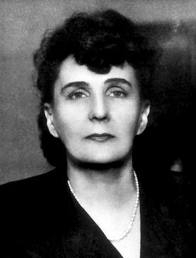
Born: 1884 in Warsaw,Russian partition of Poland,(presently Poland)
Died: December 17, 1954, Warsaw, Poland
Early days. Father, Waclaw, a well known geographer and literary critic; mother, Anna Safrankova (from Moravia). Zofia finished a private boarding school and the underground Uniwersytet Latajacy (Flying University). She was mostly self-taught.
Career. Her first novel, Lodowe pola (Icy fields), appeared in 1904. After the WWI she started analyzing inter-human relations. In her attitude one can see among others the influence of the philosophy of modernism and of the lecture of Dostoyevski's novels. In 1922 she started writing a series of essays called Charaktery attempting to describe human psyche. The last essay appeared in 1948. In 1920 she started working for the Polish government in the Office of Foreign Propaganda. In 1928 she was elected the vice-chairman of the Polish PEN-Club. In 1933 she became a member of Polish Literary Academy. At that time she joined the group "Przedmiescie." In 1935 her award-winning novel Granica was published. Nalkowska was also an active feminist and a member of Belgian Women Academy. During WWII she took part in the underground literary life. After WWII she participated in the work of the International Commission for Investigation of Nazi Crimes in Poland. As the result of it she wrote a collection of short stories Medaliony. She was also a member of the Polish Communist Parliament and an activist in the- dominated by the Communists- Polish Committee for the Defense of Peace.
Private. In 1904 she married Leon Rygier a journalist and an educator. They divorced in 1918. In 1922 she married, Jan Jur-Gorzechowski, an activist of OB PPS (Polish Socialist Party). In the period between WWI and WWII he became a general and the commander of Border Guard. They divorced in 1929.
Prizes and awards. 1929 - Prize of the city of Lodz; 1936- State Literary Award for Granica; 1936- Golden Laurel from the Polish Literary Academy; 1953- State Literary Award for the whole of her work; 1994- one of Venus craters named after her by the International Astronomical Union;in various Polish cities and villages there are streets named after Nalkowska.
This article uses, among others, material from the Wikipedia article "Zofia Nalkowska" licensed under the GNU Free Documentation License. :
Wikipedia (in Polish) List of works
Other sources:
Biography (in Polish)
An encyclopedia of continental women writers by Katharina Wilson(p.897...)
English translations of some of her works:
Constance J. Ostrowski
Return to home page:
Prominent Poles